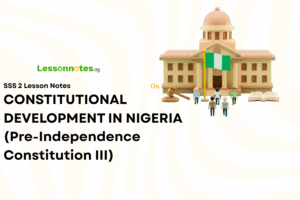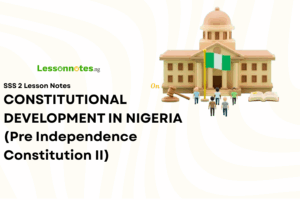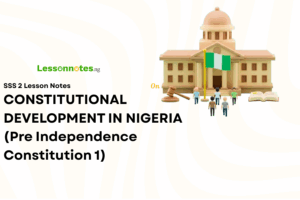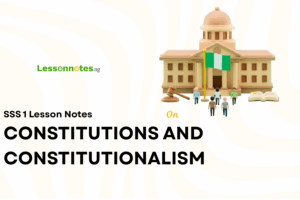Colonial Administration (British Colonial Administration) SS2 Government Lesson Note
Download Lesson NoteTopic: Colonial Administration (British Colonial Administration)

DEFINITION OF COLONIALISM IN AFRICA
Colonialism may be defined as an imposition of a more developed culture over a less developed one backed up by expansionist and economic adventure.
It may also be defined as the forceful ruling of one country by another. It is the extension of political control of one powerful nation over a weaker nation. This means the weaker nation is politically dominated and economically exploited by the stronger one. Colonialism is sometimes called imperialism.
HISTORICAL BACKGROUND
The first attempt made by Britain to set up a formal government in Nigeria was in 1900. Before the 1880s, Europe had what is known as the Industrial Revolution. This brought the desire to source for finished goods.
Britain, Belgium, France, Germany, Italy, Spain and Portugal were involved in the colonies in Africa. So, the competition led to the scramble and partition of Africa. At the Berlin West Africa conference of 1884-1885, African lands were shared with European countries as colonies.
The first British attempt to set up a formal government in Nigeria was in 1900. By 1900, what is known as Nigeria today was made up of 3 separate administrative areas or units namely:
- Colony of Lagos
- Protectorate of Northern Nigeria
- Protectorate of Southern Nigeria
In May 1906, Lagos colony and southern protectorate were joined together and renamed the colony and protectorate of Southern Nigeria. In 1914, Lord Frederick Luggard amalgamated Lagos and Southern Protectorate with the Northern Protectorate to form a single colony called Nigeria.
REASONS FOR COLONIALISM
- Economic reasons:
- Raw materials for industries: Following the Industrial Revolution in Europe between the 18th and 19th centuries, European industrialists needed a large quantity of raw materials to feed their industries. This brought them to Africa (Nigeria).
- Market: The Europeans were also looking for markets outside Europe to sell their excess product. Africa was seen as a new market to be utilized.
- Social Reasons: The colonies were seen as a place to settle their surplus population
- Cultural Reasons: Colonialism was also seen as a means of civilizing the blacks who were wrongly believed to be primitive.
- Humanitarian Reasons: The Colonizers also explained that it was a means of stopping the slave trade and inter-ethnic wars in West Africa.
- Religious Reasons: The European’s adventures to the West African coast had the motive to win souls for God and convert Africans to Christianity.
- Prestige motive: Colonialism was seen as a means of enhancing the prestige of metropolitan centres like Britain and France.
- Political Reasons: The Europeans wanted to extend their spheres of influence and rule the territories in Africa.
- Explorative Motive: Many European explorers came to Africa to explore various parts of Africa to discover various human and natural resources.
FEATURES OF COLONIAL ADMINISTRATION
- Central Administration: This was headed by the Government. He was appointed by the Secretary General of State for colonies. The Governor is the president of both the legislative and executive council.
- Native administration: The colonial administration instituted a system of native administration in the protectorate, provinces and districts through the indirect rule system.
CLASSIFICATION OF BRITISH COLONIES IN WEST AFRICA
- Crown colony: This is established by military conquest. The geographical territory is owned by the British crown as property e.g. Lagos colony.
- Protectorate: This refers to a territory under the protection of the British government. It was protected against other European conquest e.g. Northern and Southern protectorate of Nigeria.
- Trust territory: These were the colonies under the control of Germany before it was defeated by the allied powers e.g. Cameroun, Togo and Tanzania.
ASSIGNMENT
- Nigeria was colonized by
(a) Britain (b) France (c) Germany.
- The Northern and Southern Protectorates were amalgamated by
(a) Sir Lord Luggard (b) Sir Clifford (c) Sir Richards.
- The following were reasons for colonialism except
(a) prestige (b) religion (c) slave trade.
- African lands were shared with European countries in the year
(a) 1885-1886 (b) 1883-1884 (c) 1884-1885.
- The name Nigeria was formed by
(a) Flora Shaw (b) Lord Luggard (c) Queen Elizabeth.






















